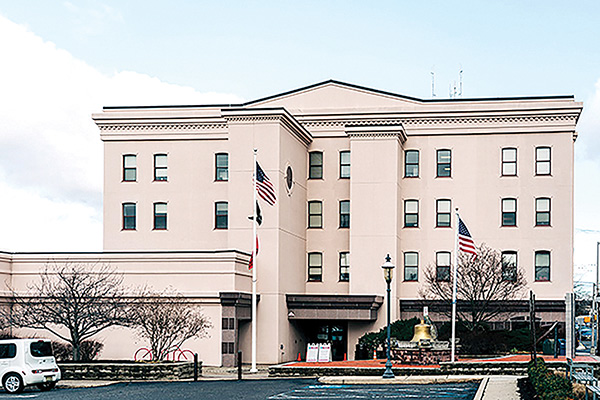
By Allison Perrine
RED BANK – Red Bank officials are unanimously supporting a plan that could potentially change the borough’s existing form of government, as discussed last Wednesday during the May 5 borough council meeting.
All six council members unanimously agreed that the borough should draft an ordinance that, if approved, would put a question on the November ballot asking Red Bank residents whether or not the town should establish a five-member, resident-led charter study commission to determine if or how the government style should change.
The idea for a change to the partisan borough council style is not new in Red Bank. Some residents in the borough, which has been under majority Democratic rule since the 1990s, have petitioned for changes for some time but the issue was never addressed, according to Red Bank Mayor Pat Menna.
“The world has changed since 1907 and we should not be afraid to create a nonpartisan public input system of citizens as well as leaders in this field who will have the opportunity, in an academic sense, to study the various governmental options that may be available at the local level,” said Menna.
When Red Bank began operating under its current style of government, it was “a sleepy riverfront trading center” and its economy was surrounded by adjacent residential farms and railroad-driven commerce, said Menna. Other towns throughout New Jersey operated the same way and have since looked at their government style “to explore whether it is still relevant, operational, as well as efficient,” he added. That includes Highlands Borough which changed from a partisan borough council to a nonpartisan borough council in 2014.
According to borough attorney Gregory Cannon, there are two ways for the borough to change its form of government under municipal charter law: with resident petitions or through a charter study commission. To establish the commission, the governing body would adopt an ordinance that places a question on the November ballot in Red Bank asking residents to weigh in on whether or not they support creating a charter study team. The ordinance would be adopted at least 75 days before the election to allow for proper notice.
At the same time, residents hoping to serve on the commission would file petitions with the borough clerk to do so. If the question is approved by the majority of voters in November, five candidates would be appointed to the team and their work would begin within 15 days of the election, including the nomination of a chairperson and a requested budget if necessary.
From there the commission would conduct studies and recommend one of three options. The simplest would be to keep the existing form of government. If members suggest a change to another style of government, the borough would hold a special election within 60 to 120 days to see if residents agree with the proposal. Or the commission could decide that a change is necessary but not to any existing options. In that case, the commission would draft a special charter for the community, which would require permission from the state legislature. According to Cannon, that option is “not common but a possible outcome.”
“It’s a democratic process,” said councilman Ed Zipprich. “It enables the people in the community to vote for or against a charter commission study and at the same time enables people from all throughout the community to run for commissioner, to take a seat on this examining commission to come up with recommendations for the municipality.”
Similarly, councilwoman Kate Triggiano called the idea “true progress” in that it can help move the borough forward and bring residents to the table to ensure that elected officials are doing their due diligence, she said. “What we’re doing is making a bold move to show that we’re listening to people and that we know there needs to be a change.”
During the public comment portion of the meeting, borough resident Ben Forest said he was “very proud” of the council for its decision to begin the process of examining its form of government.
“It’s a historic night for Red Bank – long time coming,” he said, adding that he thinks the conversation has been happening since he moved to town in 1996. Forest said he is currently torn on whether or not he feels the borough should move to a nonpartisan form of government but is leaning in that direction.
Resident Stephen Hecht also shared his excitement about the potential process ahead. “We are together going forward to something that we all need to learn about and those who are willing to work on the charter study commission will hopefully be able to educate all of us as they educate themselves, and when it comes time to make a choice about a form of government, that we will have clear notions of what the options are.”
A FAREWELL TO ZIAD SHEHADY
The May 5 meeting marked Ziad Shehady’s last day on the job as borough administrator. After serving in the role for three years, Shehady filed a letter of resignation April 7. Menna and others – including members of the public – praised his work in that role, which the mayor said Shehady “revolutionized” for the borough.
“He’s boldly and unapologetically faced the issues that in many instances have been sugarcoated for many years, for decades. He has confronted the challenges in a forthright matter, a strong matter, which some people may have not liked but in everything that he did and continues to do, I can tell you that he has extended 1,000 percent of his energy and commitment for this municipality,” said Menna.
He acknowledged the commitment was sometimes met with friction and objection from some borough departments. Despite that, Menna commended Shehady for his dedication to Red Bank, its residents and visitors.
“I am grateful for you entrusting me with the care of the Borough, from the often unsung employees who are the backbone of the municipality to the residents, businesses, and visitors. I hope that in the nearly three years of service to the Borough, though some decisions may not have been politically convenient or popular, I have made you proud through deliberate, decisive and thoughtful management,” Shehady wrote in his letter of resignation. He added during the May 5 meeting that serving the borough has been his pleasure.
Councilwoman Horgan added that she is “astounded” by Shehady’s breath of knowledge and that she is sad to see him go. “He does his homework and he’s really pushed the borough forward in the best of ways. It’s our loss and I don’t think there will be another ‘Z.’ ”
This article originally appeared in the May 13 – 19, 2021, print edition of The Two River Times.














